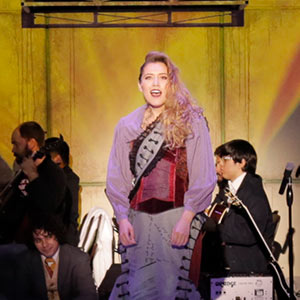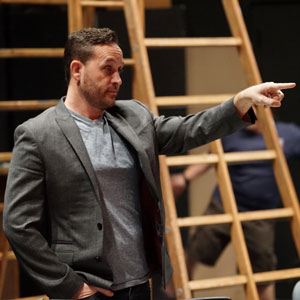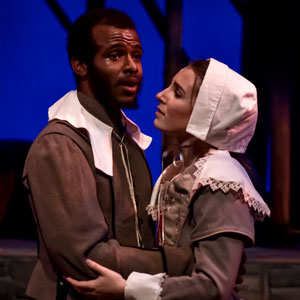'Hair' Presents metaphor for meaning of life
— Fullerton College Hornet - David F. Burke - Friday, March 23rd, 1990"Give me a head with hair, long beautiful hair."
When the cast of "Hair", the rock musical now being. presented in the Campus Theatre, first sing these lines from the, production's title song, it seems to be little more than an expression of their need to rebel.
But as the production -unfolds, a second interpretation emerges. The message is really "give me a life with meaning." Though the characters seem content to "drop out, tune in and turn on," the story reveals frustration and unhappiness just beneath the surface.
"Hair" was clearly intended to assault sensitivities. More than 50 cast members dance, sing and shout their way through almost as many songs, displaying unbridled irreverence for mainstream values.
Although the mores of 1990 are considerably different from those of the mid '60s, when Gerome Ragni and James.Rado wrote "Hair", the production's shock value remains strong.
Cast members alternately attack or lampoon sex, drugs, war, religion, racism, draft-dodging, patriotism and families. The language is deliberately profane, with one song comprised almost entirely of "forbidden" words - some of which are certain to offend almost every member of the audience.
The assault is not limited to the words and ideas presented in Hair. The audience is literally invaded from time to time as members of the cast leave the stage and move among the seats.
Keith Henderson, 29, of Laguna Beach plays Claude, the central character.
Henderson is himself a playwright, his current project is a screenplay,"Crystal Rose." Henderson also performs as a member of the band, Angel City
"I am so proud of this show and the kids in it," said Henderson. He admits that he didn't anticipate the high level of commitment, enthusiasm and talent that has resulted from the two-month-long effort.
Guest director Gary Gardner, a drama instructor from UCLA, describes the play as "a happening that they set music to."
Gardner said that the extensive use of Vietnam war footage and inclusion of shots of the war memorial in Washington, D.C. are intended to focus attention on the historical significance of Hair in documenting
attitudes regarding the war
"The play at that time said, 'tune in, tum on, drop out, love each other, have fun and keep protesting the war," said Gardner. He feels that the message today may be "to let the younger people know what their parents were going through at that time (the '60s)."
Part of the value of "Hair", according to Gardner, is to help viewers "to remember how young and innocent the people who died in the war were."
Despite the focus on '60s issues and the exaggerated characterization of hippies by the actors, the performance offers messages which are as relevant to the present as they were twenty-five years ago.
The central theme of the show is a search for meaning in life. While agonizing about the draft, Claude asks "Why do I live? Why do I die? Tell me, where do I go? Tell me why?"
Though the tone of the presentation is unrestrained, almost uncontrolled, reality is brought into clear and tragic focus at the conclusion. Claude's solution to dealing with the complexities of life - becoming invisible - proves impossible.
When reality finally hits, which is quite late in the show,'a sudden seriousness shrouds the theater. The audience realizes that despite the wild, irreverent treatment of issues, the impact of those issues on the characters in the story is substantial.
Every member of the audience is forced to deal with the production. The book and the assaultive presentation presented by Gardner and his cast do not allow complacency.
Like the '60s, the production presents choices and challenges in a compelling fashion and then demands that. people become involved.








